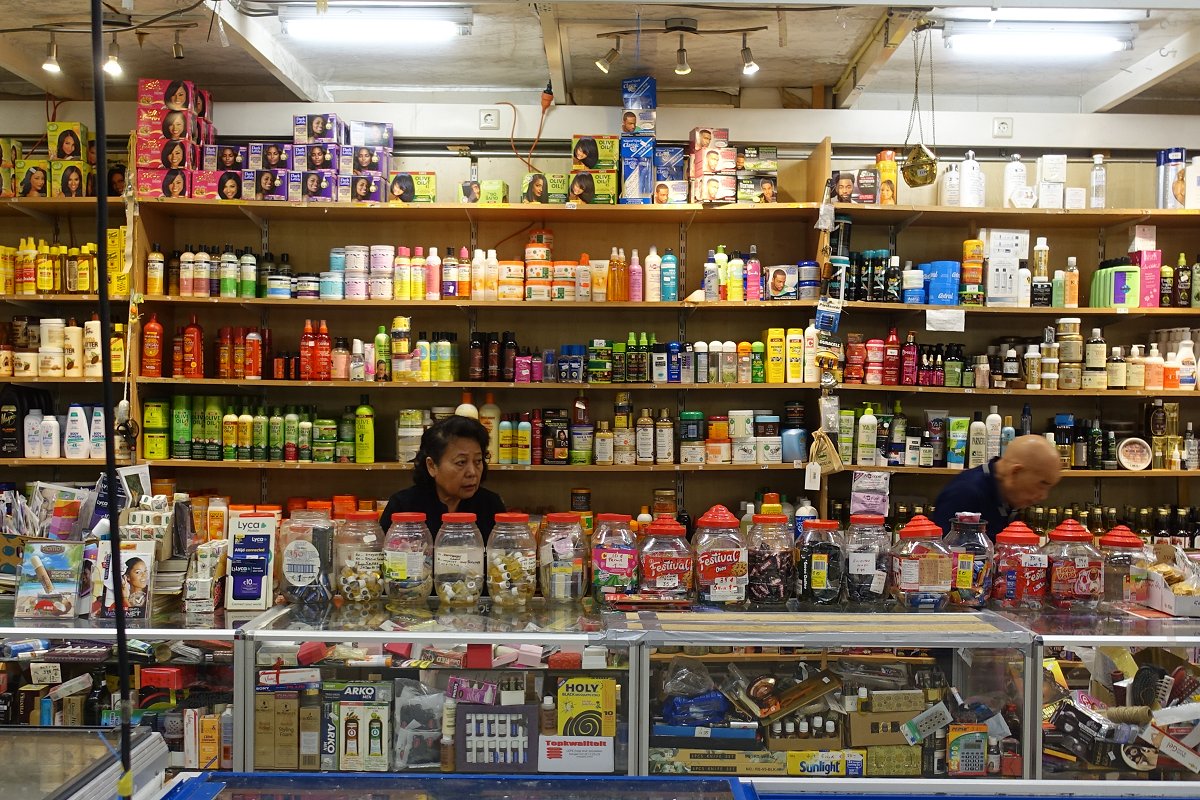Toko Story – Omoe, a toko as kind of living room
This year (2025) Toko Omoe in Bijlmer Ganzenhoef (borough Amsterdam Zuidoost, Netherlands) celebrates its 50th anniversary. Founder Kai Hing Li (84) and his son Ramon Li (46), the current owner, are looking back on the changes over the years and sharing what the toko means to the neighbourhood. A story about the beautiful Omoe toko as kind of living room. Social cohesion in the neighbourhood due to a local shop.
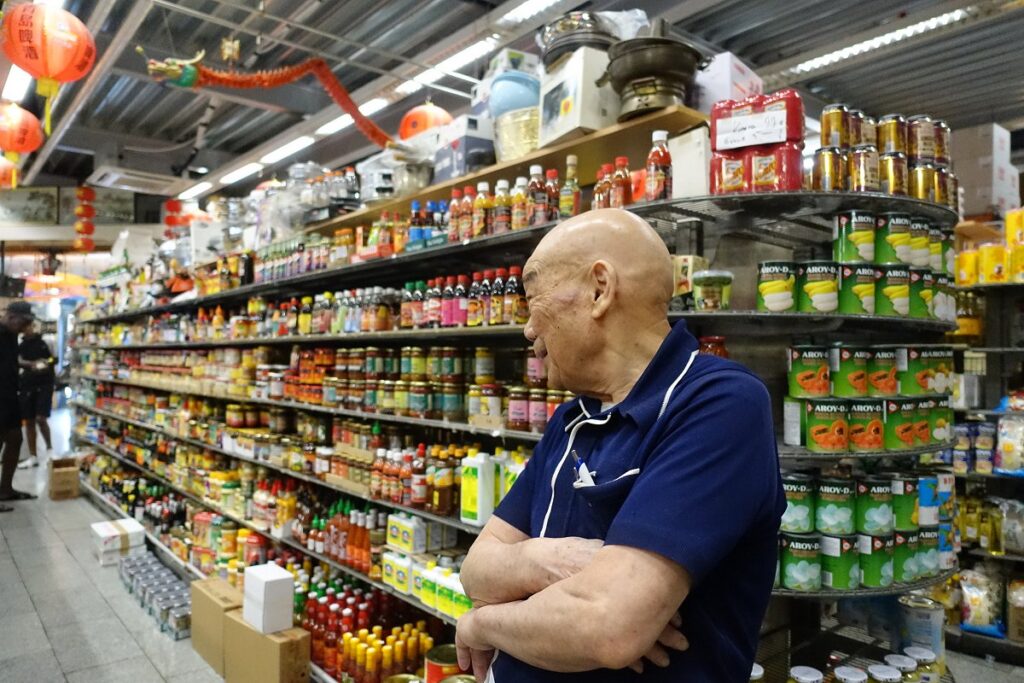
Kai Hing Li in his shop.
Update November 25, 2025 – Royal distinction for Omoe
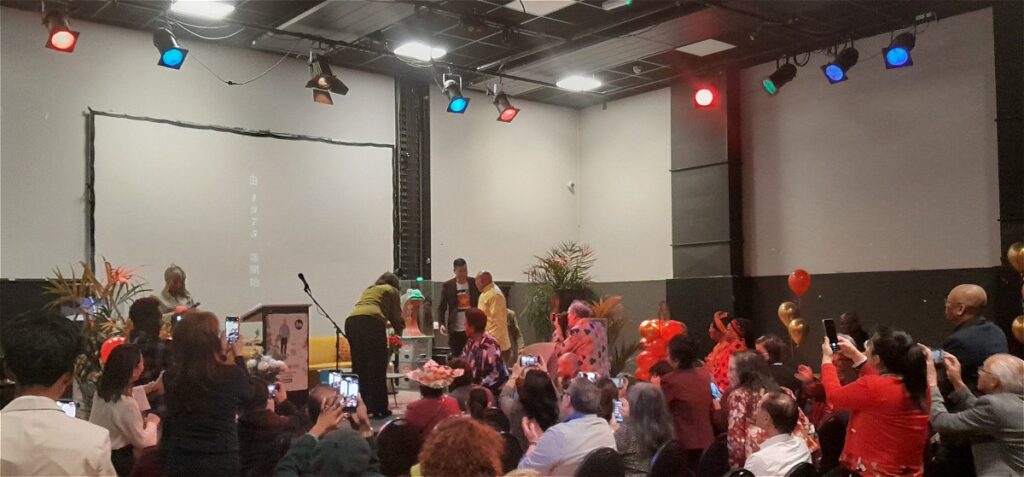 At a celebratory gathering in the Zuidoost district of Amsterdam, Alderwoman Hester van Buren, in her role as Deputy Mayor, presented Omoe with a royal distinction. According to Van Buren, Omoe is a pioneer who single-handedly brought connection to the multicultural community of Zuidoost. Living proof that the vision and dedication of one person can have a significant impact on bringing people together and building a community where everyone is welcome.
At a celebratory gathering in the Zuidoost district of Amsterdam, Alderwoman Hester van Buren, in her role as Deputy Mayor, presented Omoe with a royal distinction. According to Van Buren, Omoe is a pioneer who single-handedly brought connection to the multicultural community of Zuidoost. Living proof that the vision and dedication of one person can have a significant impact on bringing people together and building a community where everyone is welcome.
Interview by Eva Henckens (February / August 2025)
Can you tell us more about the founding of this shop?
Kai Hing: I started this shop (toko) a long time ago, exactly 50 years ago. I have worked there almost every day since then. Some regular customers have been there since the beginning. Before that, I worked in my father’s supermarket in Suriname for 14 years. I took over the hard work from him. Even on his wedding day, he was working in the shop in the morning.
Many shops don’t last 50 years. How did you manage to do this?
Kai Hing: Many customers have a good experience and tell others about it. They recommend our shop to other people, and they come back again. I make sure it always looks perfect, customers don’t like clutter. There is also something for everyone. We sell products from many different countries.
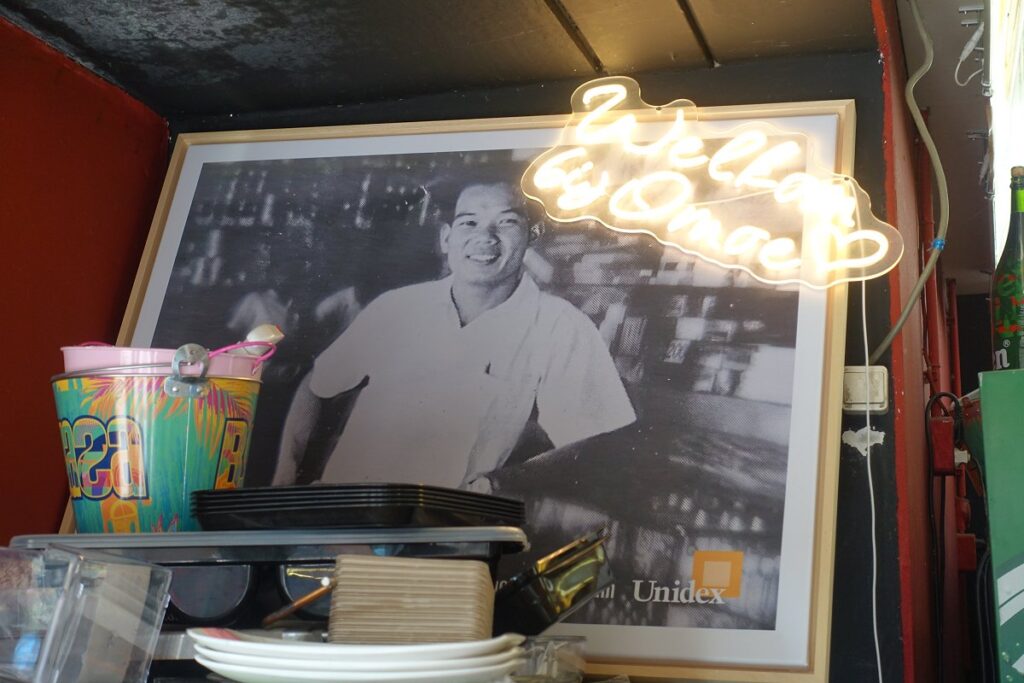
“Welcome at Omoe”. Social cohesion in the neighbourhood due to a local shop.
What role does your shop play in the neighbourhood?
Ramon: There is a very strong form of social cohesion around our shop. We are a kind of living room. Many customers come to our shop straight from work, without needing anything. People come here with their life problems, technical problems, love problems and fiscal problems. People can unburden themselves to us. We are neutral, a kind of Switzerland, we do not judge. Our new customers also feel at ease straight away. Everyone thaws when they come to the shop. Furthermore, my father is a phenomenon, so energetic at this age, and he knows everyone.
Kai Hing: Many customers feel at home because they have known me for a long time. I hear from many people that they like me. Everyone calls me ‘Omoe’, which means uncle in Surinamese.
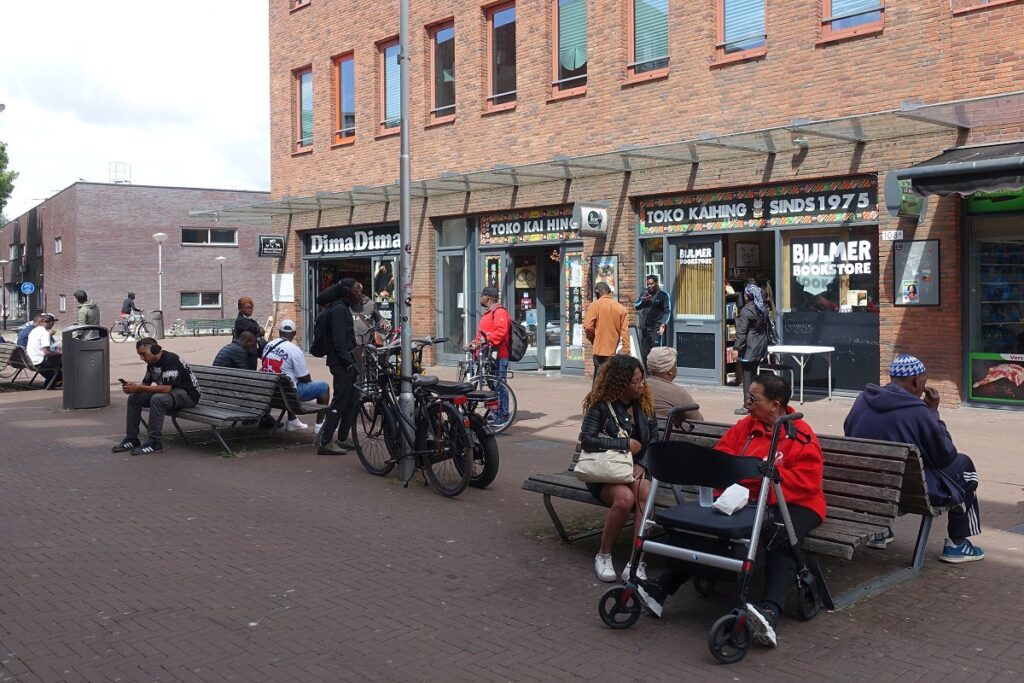
Streetlife in front of the shop. Social cohesion in the neighbourhood due to a local shop.
What has changed in the neighbourhood in all that time?
Ramon: A lot. In the 80s, Bijlmer was a bit criminal. Then they renovated the neighbourhood. Next came a period of a lot of demolition and the middle incomes moved away. I call it the rise and fall, and again the rise of Bijlmer. Now we are heading towards a yuppie neighbourhood with more baristas, vegan businesses, expats and students. We have seen a lot of different target groups of people come and go. On the one hand, you have to adapt to it, on the other hand, you don’t want to change. Our strength lies in the fact that we have remained authentic all that time.
What has changed in the shop?
Ramon: Very little has changed in the shop. That is precisely our charm. The assortment has changed somewhat. We used to have everything, from sewing kits to washing machines to an bicycle inner tube. Now, of course, there are other shops for that. We are increasingly moving towards a classic toko. Individual stores are increasingly specializing, and so are we.
What do you like most about working in the shop?
Kai Hing: I get a lot of energy from working here. I like being with people. Sitting at home and watching TV is not for me, and it makes you grow old faster. I can’t stay home, not even a single day.
Ramon: The energy between the neighbourhood and my father, that motivates me to keep the business going. I really think he has developed a piece of cultural heritage for the neighbourhood. How we all interact with each other here should get some kind of title, so that it is safeguarded.
How do you see the future of the shop?
Kai Hing: We will continue for another 50 years. No, even longer, infinitely. I am officially retired, but I’m faster than most colleagues here. In the meantime, my son has been the owner for a while. He is going to modernize it further.
Ramon: That the shop will continue for as long as possible is a wish, but it is also a big challenge. Gentrification and the associated increase in costs make it difficult. A supermarket chain has much more capital than we do. I see a dark cloud coming. It is because we are an old business with a lot of support from our existing customers.
There are certainly plans for the future. I want local entrepreneurs to work in our building. For example, a small barista. Then you have a combination of shop and catering. In this day and age, you have to grow with it. At the same time, we stimulate local entrepreneurs. These plans are still difficult to realize, but they are certainly on my mind.
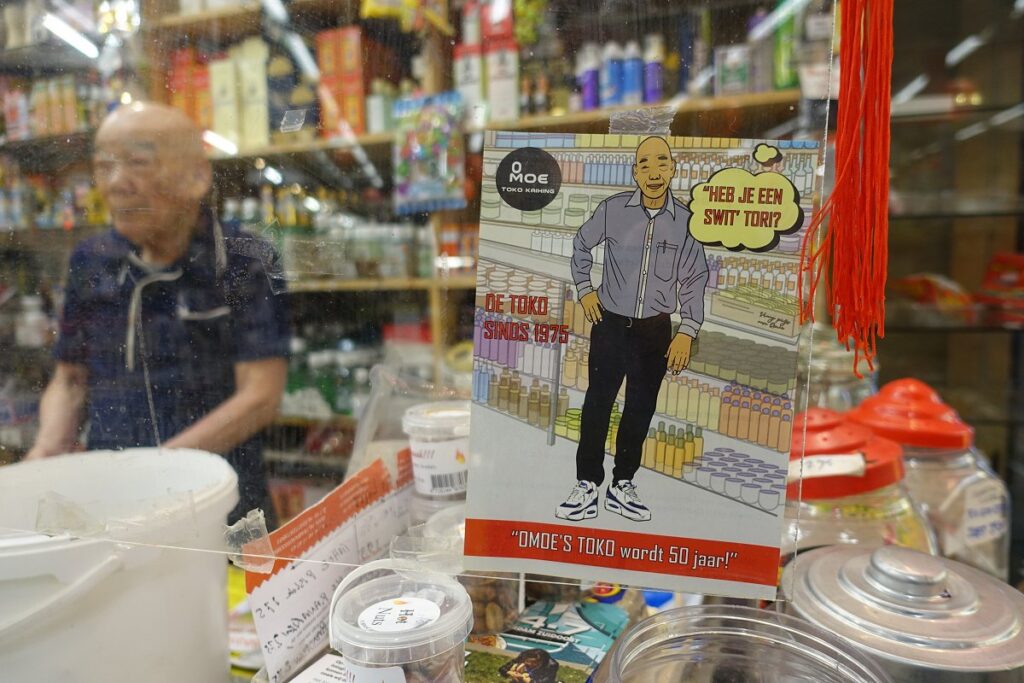
Backgrounds
‘Omoe’ is a pet name given by those who have a strong bond with the shopkeeper – spelled ‘Omu’ in Sranan Tongo (‘Surinamese tongue’), the English-based creole language from Suriname. Bijlmer-based Imagine IC organised an exhibition about Toko Omoe (April-July 2025): Not Just Any Omoe. With this kind of events Imagine IC aims to document current social relations through participatory heritage work, and to improve them – by having very different people negotiate with each other about what constitutes the heritage of their own time, thus gaining empathic insight into the positions and ambitions of others.
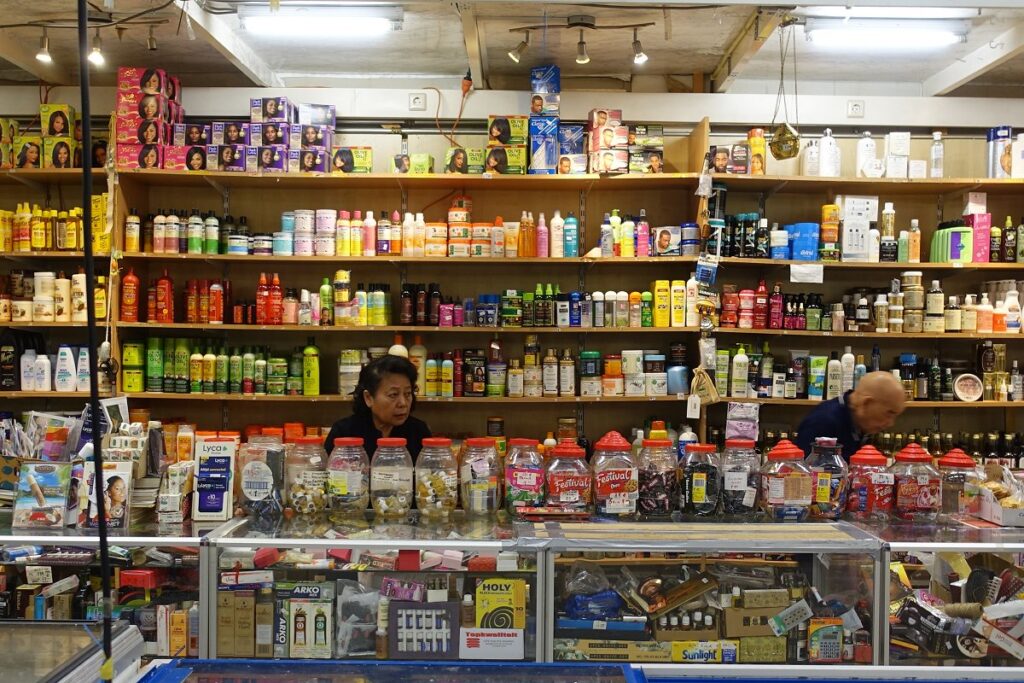
Social cohesion in the neighbourhood due to a local shop.
Not Just Any Omoe is a celebration of the appearance of ‘Omoe‘ and the disappearing phenomenon of the ‘neighbourhood shop’, which is under severe pressure in modern society. It is also a celebration of the first generation of Bijlmer residents who, despite many challenges, served as a stepping stone and stonfutu (‘pillar of strength’) to help the generations that followed.
For many customers, it’s a place of great significance, a meaning never captured. Many generations grew up with this store or similar neighbourhood shops. But changing neighbourhoods, a new generation of residents, the pace of life, and the role of large supermarket chains are increasingly threatening the existence of these places.
This project captures the significance of the local shop as part of the Amsterdam collection. It’s an ode to the Omoes/Omus, to Kai Hing, and to all the local shops that play a similar role in neighbourhoods throughout the city and the country.
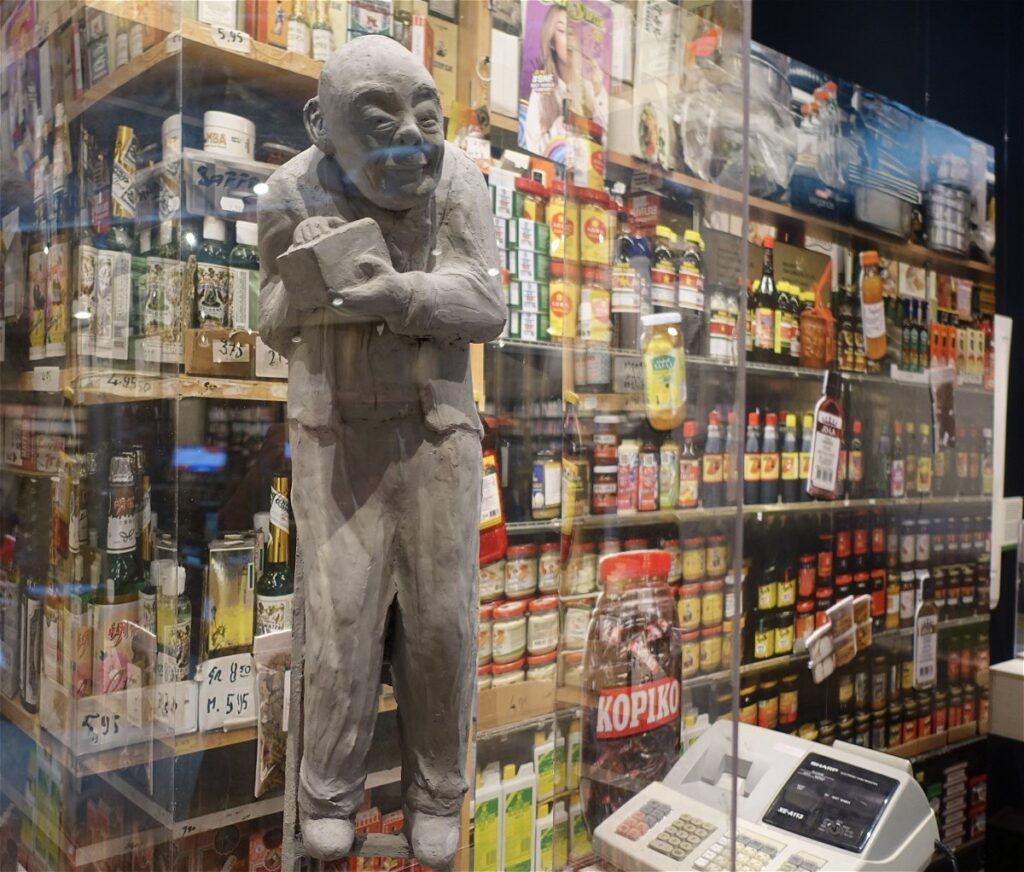
The plan is to erect a statue of Kai Hing Li. Visitors to the exhibition could vote on four designs for the projected sculpture. More on this in the next update of this report …
Acknowledgements
The interview of Eva Henckens previously appeared in February edition 3-2025 of Z!, the street newspaper of Amsterdam.
Interview-text: Eva Henckens
Other texts: Imagine IC (adapted by Favas.net)
Translation & editing: Favas.net
Images: Favas.net
Many thanks to Kai Hing Li and Ramon Li for their cooperation and warm welcome.

Social cohesion in the neighbourhood due to a local shop.

